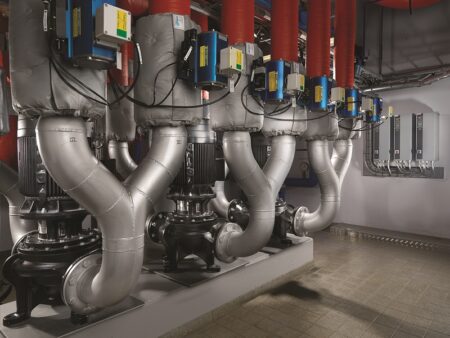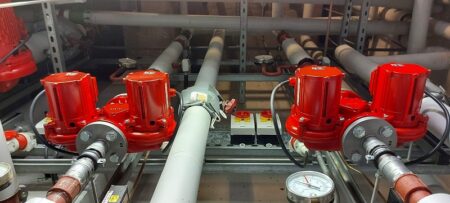Summer cooling tips for education settings
John Calder, technical director at Dura Pump, shares his top cooling tips to keep education facilities operational over the summer

John Calder
The UK is heading towards what is predicted to be another record-breaking summer, with the start of May already confirmed as the hottest on record.
And ensuring essential cooling systems operate at peak efficiency is vital for schools, colleges, and universities across the UK.
Prolonged heatwaves and higher temperatures expected for summer 2025 will place increased strain on HVAC and pump systems – vital infrastructure that can be overlooked after months of minimal use during winter.
In schools, colleges and universities, a failure of these systems can lead to serious disruptions, health risks or closures.
Here, I share my expert advice drawn from over 15 years of experience to help facilities teams stay one step ahead and avoid costly downtime this summer.

Run your pumps early to avoid surprises
In an ideal world, maintenance would be carried out regularly throughout the year, as regular inspections help identify leaks, worn components, and loose connections early.
Routine tasks such as filter replacements and system flushing are essential for keeping pumps in top condition and prepared for the increased demands of summer.
It’s not uncommon for pumps to seize after a period of inactivity.
Running your system early in the season helps uncover these issues in a controlled, low-risk environment, giving you time to schedule routine maintenance tasks before they become urgent, and harder to manage at a time when the pumps are needed the most.
Prolonged heatwaves and higher temperatures expected for summer 2025 will place increased strain on HVAC and pump systems – vital infrastructure that can be overlooked after months of minimal use during winter
After months of inactivity, cooling pumps can seize or malfunction when first reactivated, often due to hardened seals, blocked impellers, or corrosion. Simply switching the system on when the hot weather hits can reveal hidden faults during peak time.

Check system pressurisation
Getting the pressure right in your cooling system is more than a box-ticking exercise; it is critical to performance and safety.
If the pressure is too low, the system may stop working entirely.
But, if the pressure is too high, this may damage pipes, cause excessive water usage, leaks, and shorter appliance lifespans.
It’s a simple check, but one of the most important on your summer maintenance to-do list.
Cooling systems rely on a consistent pressure range to function properly. A failing or incorrectly-configured pressurisation unit can lead to airlocks or system failure, both of which reduce cooling efficiency and increase wear.
A full inspection and recalibration of control systems ensures your setup is running efficiently and responding correctly to demand
Installing pressure sensors can also help monitor performance continuously.
Pressure sensors function as a protector, contributing to improving their system performance, extending the pump’s lifespan, and reducing energy.
With alerts set for pressure fluctuations, facilities teams can catch issues early and intervene before they escalate.
Test and calibrate your control systems
Even the most-efficient cooling system can fall short if the control panel isn’t doing its job properly.
If your controls are unreliable, it doesn’t matter how well the rest of the system performs.
A full inspection and recalibration of control systems ensures your setup is running efficiently and responding correctly to demand.
Testing control panels, sensors, and automation sequences can prevent future energy waste, and reduce unnecessary strain on the pumps themselves.
During seasonal transitions, recalibrating your sensors and controllers is key.
If temperature or flow sensors drift out of calibration, your system might underperform or overcompensate, driving up your energy usage unnecessarily, and in today’s climate – both economic and environmental – no organisation can afford that.
So, whether you’re aiming to cut operational costs, or meet sustainability targets, ensuring your control systems are accurate and responsive is a simple and impactful step you can take.

Check for blockages and circulation
The pumps are the heart of any cooling system, and if circulation fails, performance drops fast.
Blockages and airlocks in a cooling system can reduce performance and prevent chilled water from circulating efficiently.
Before demand increases, check that your circulation pumps are working properly and that servicing is fully up to date.
Whether you’re aiming to cut operational costs, or meet sustainability targets, ensuring your control systems are accurate and responsive is a simple and impactful step you can take
Clogged strainers or airlocks in the system are a major contributor to poor circulation. It’s also essential to check that air vents, filters, and cooling coils are clean and free from dust, dirt and debris, as these can restrict flow and reduce overall efficiency.
As mechanical systems with moving parts, including electric motors, impellers and belts, pumps should be given a full service ahead of summer to ensure consistent and uninterrupted operation.
When in doubt, call in an expert
Even when a system appears to be working, that does not mean it’s running efficiently.
Pumps may be overworked, poorly controlled, or simply outdated. And inefficiencies like these can lead to higher energy bills, unnecessary strain, and a greater risk of failure during peak usage.
Professional servicing allows you to assess your system’s performance.
Engineers can recommend upgrades such as variable speed drives, smarter control systems, or replacement for antiquated belt-driven pumps.
It’s not just about whether a system works, it’s about how efficiently it runs.
Simple checks now can prevent delays, term-time disturbances, and costly emergency repairs later in the school year
If pumps are overworked, outdated, or lacking smart controls, there’s a huge opportunity to upgrade to modern energy-efficient technology.
That means better reliability, lower running costs, and reduced carbon emissions.”
Post-summer holiday drain and pumps checks
Schools, colleges, and universities may be quieter over the summer break, but their cooling and circulation systems still need attention.
Extended periods of inactivity, combined with warmer weather, can affect system pressurisation, reduce circulation efficiency, and increase the risk of faults going unnoticed.
For education sites, it’s about preventing problems during the closed period and ensuring everything runs smoothly before the students return.
Simple checks now can prevent delays, term-time disturbances, and costly emergency repairs later in the school year.
